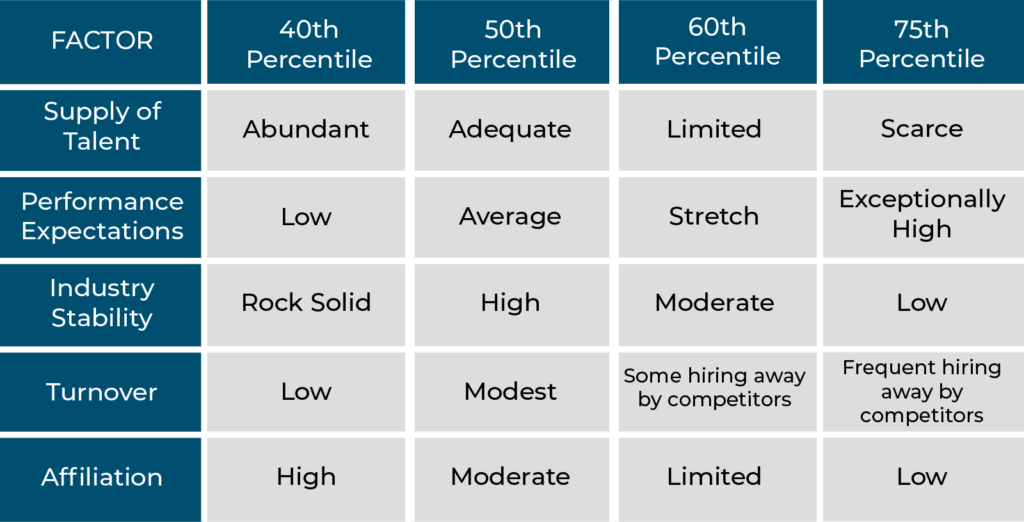**Updated in 2023
Salary negotiations with top performers are a pivotal time in the hiring process. As an employer, it’s easy to forget that the candidate is not yet one of your employees. You can create or destroy trust and set the tone for your entire employment relationship by how skillfully you negotiate salary. Sadly, salary negotiations are also where hiring managers risk snatching defeat from the jaws of victory. Job seekers have access to credible salary information and, with the rise in pay transparency, can see what other organizations pay for similar roles at a glance. You need to assume they know the market for their skills as well, or better, than the hiring manager.
Early in a new search, and again at the offer stage, we talk with hiring managers about what kind of salary they plan to offer the candidate. In those conversations, it appears that many hiring managers struggle to find a framework to talk strategically about employee compensation. Fortunately, most experts agree on what factors you should consider in discussing compensation. Before we start with the expert recommendations, let’s first dispense with two common, but counterproductive salary negotiation tactics.
Counterproductive Salary Negotiation Tactics
The weakest logic I hear from hiring managers is, “I just looked at the candidate’s previous compensation and added 10%.” This flawed approach demonstrates that the manager has no compensation strategy of their own. They are simply hoping the candidate’s last company had a smart compensation strategy; otherwise, they could end up compounding the very mistake that caused that employee to consider leaving. In August 2016, Massachusetts became the first state to prohibit salary history questions and 20 others have followed suit since—this practice may already be illegal in your state. Find a running list of salary history bans here.
Another salary negotiation tactic that’s certain to backfire is to low-ball a job offer to a top performer expecting that they are either poorly informed enough to accept it or willing to keep negotiating after a bad-faith move from the hiring manager. But taking this approach overlooks the big picture of compensation—you need to pay fairly because other employers are competing for the very same people. Top performers will simply go elsewhere, to find an employer that understands their market value and does not play games with their pay.
You simply can’t wing it in these conversations—money is too much of a hot-button issue. Follow Dan Pink’s advice from his book Drive:
“The best use of money is to take the issue of money off the table . . . Effective organizations compensate people in amounts and in ways that allow individuals to mostly forget about compensation and instead focus on the work itself.”
— Author Dan Pink
What about just using the data found in salary surveys? In some organizations, when I ask how they determined a target salary range, I hear, “That was the range HR gave me.” And when I ask HR how they arrived at a target salary, I usually hear, “We want starting pay to be in the midpoint of the salary range.” (In other words, the median, or 50th percentile figure in a salary survey.) It sounds fair and scientific, so what’s wrong with that?
Alas, even when your compensation philosophy is to pay 50th percentile overall, that doesn’t mean you should just pay everyone the number you looked up in the salary survey. You need to adjust it based on other factors like the market’s supply of talent, your performance expectations and turnover rates.
“You have to be very clear about the criteria that determine an individual’s pay. It doesn’t matter whether it is education, experience, performance, the size of the department, the department’s revenue responsibility, etc. But for a system to be perceived as fair, you have to articulate your organization’s key drivers for the internal pay hierarchy. You’re not going to get any return by paying people the same. If you say, ‘All Directors should be paid the same,’ regardless of performance, experience, etc., it ultimately demotivates your high performers. Instead, create consistent criteria for where an employee and their position fall in the salary range.”
— Compensation expert, Kim Keating, President of Keating Advisors
Five-Factor Framework for Determining Salary
To determine the appropriate pay rate for a position, the compensation professionals at Keating Advisors start with the data in salary surveys and then adjust their salary recommendations based on the five-factor framework below:

For example:
- If the local supply of talent for a particular skill is scarce, you might need to pay at the 75th percentile of salaries in the survey.
- If the local supply of people with a particular skill is abundant, you might only need to pay at the 40th percentile.
- If your performance expectations for the position are exceptionally high, you should consider paying at the 75th percentile.
- If your performance expectations are merely average, the 50th percentile might do.
In the executive search world, we operate almost exclusively at the intersection between a scarce supply of talent and exceptionally high performance expectations. But not all my clients need to make salary offers at the 75th percentile. To spend your salary budget wisely, you need to look at all five factors in combination. If you enjoy low turnover among your best people, and your industry has rock-solid stability while other local employers do not, you might find that paying less will work out just fine. Similarly, if your organization is highly regarded (like Google), and top performers are standing in line to work for you (that’s called “High Affiliation” on the chart), you might not need to pay top dollar.
Related Resources
We have updated salary guidance in light of trends toward salary transparency in 2023. Please see:
- How Candidates Respond to Job Ads That Don’t Disclose Pay
- How to Determine Fair (and Competitive) Compensation for New Hires
- Why Compensation Matters for Inclusive Hiring.
